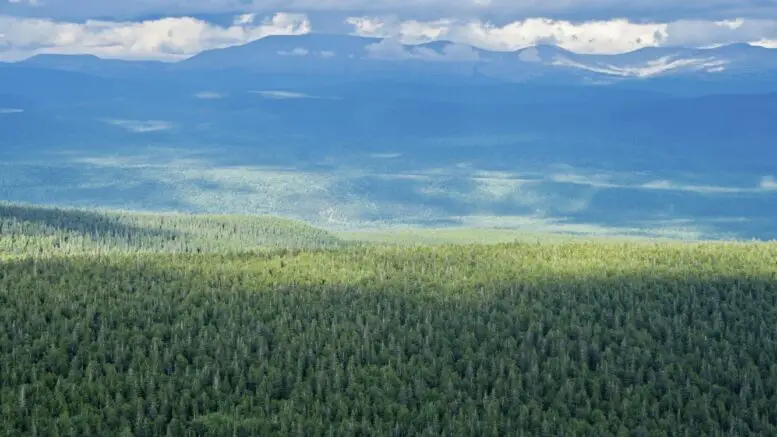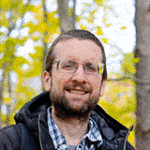Lara Peterson is the Russia, Europe and Near Asia Program Coordinator for the US Forest Service International Programs. She holds dual degrees in natural resources management and Russian and East European studies and has spent considerable time abroad both as a study abroad student and as a working forestry professional.
Students interested in environmental issues are encouraged to see Russia and the Environment, a course covering environmental history and policy in Russia and offering optional internships.
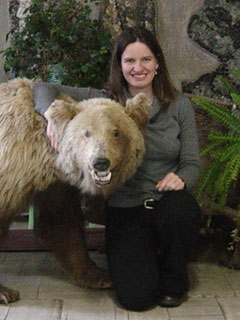
Lara Peterson with a stuffed bear in the lobby of the V.N. Sukachev Institute of Forest in Krasnoyarsk, Russia.
SRAS: You are currently the Russia, Europe and Near Asia Program Coordinator for the US Forest Service International Programs. First, can you tell us a little about what the US Forest Service International Programs do and second, can you tell us what you specifically do for them?
Lara Peterson: International Programs links all branches of the US Forest Service (USFS) – the National Forest System, Research, and State and Private Forestry – with partners overseas to promote sustainable forest management and biodiversity conservation. Together, we address some of the most critical disaster and natural resource issues around the world. We work in partnership with a variety of organizations, including the US Agency for International Development (USAID) and other US government agencies, local and international organizations, universities, local and international environmental non-governmental organizations, and host country governments. Our projects tap into the wide array of technical of expertise found within USFS on topics ranging from traditional forestry activities such as reduced impact harvesting and fire management to multiple use issues such as recreation, protected area management, and wildlife habitat. For more information on our programs, you can visit our website.
Most people don’t know that the USFS has an international office and, when they learn about it, wonder why a domestic agency works overseas. As with any internationally focused organization, the work our office does is all about two-way sharing information and expertise; through International Programs, USFS specialists have the opportunity to share their expertise with partners in other countries while bringing back new ideas and approaches from working in a very different context.
I coordinate the agency’s cooperative programs with partners in the Russia, Europe and Near Asia region. My team develops new partnerships and initiatives and manages cooperative natural resource projects and activities throughout the region. On a day-to-day basis, my responsibilities may include developing funding proposals, meeting with USAID and State Department colleagues to discuss US priorities in the region, implementing technical cooperation activities on specific natural resource topics, locating the right USFS specialists for overseas assignments, hosting visitors from the region for exchanges and study tours, monitoring relevant information and activities in the region, sharing information with partners on natural resource topics, managing staff, and various other – and often unexpected – things that come up during the day.
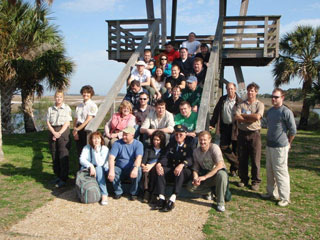
The US Forest Service, The National Park Service, and The Fish and Wildlife Service jointly hosted a Russian delegation of park and natural reserve managers to exchange information on protected area management in February 2011. Here, the delegation and hosts pose at St. Marks National Wildlife Refuge, FL.
SRAS: I must admit that I was surprised as well when I first found that the Forest Service has these international programs. However, it also makes a lot of sense, as most environmental issues are, in the end, global issues. These sorts of scientific and cultural exchanges and partnerships are also some of the most effective diplomacy for advancing the US’s relations with other countries. NASA has perhaps been the most visible of these – having always been a bright spot for our relations with Russia and the USSR.
LP: That is absolutely correct. These are global issues that we can most effectively address by sharing best management practices and working together with other countries and partners to come up with new and innovative solutions to shared problems. Russia contains over 20% of the world’s forests; it only makes sense that we would want to share information about forestry and natural resources management. But beyond the technical benefits of collaboration, we find that by working with other countries on relatively non-controversial technical topics, we are really practicing ‘soft diplomacy’ through improved cross-cultural understanding, creation of shared goals and objectives, development of professional networks, and many other positive benefits. We have often been told by colleagues working more directly in the diplomacy arena that our ‘white hat’ cooperative activities, though small in scale, provide very useful examples of positive cooperation with Russia that they can point to in their discussions and negotiations. Foresters are foresters the world over, and the shared profession and interests create natural bonds and mutual respect. That is the same for technical specialists any field and, in my mind, this is the very basis for advancing positive relations with other countries.
SRAS: Awesome. You mentioned as well “unexpected” things. What sorts of things does this typically include for you? I can’t imagine anything beyond what Russia can prepare you for. Those of us who have spent considerable time on the ground here usually consider ourselves experts in dealing with the unexpected.
LP: I agree – living and working in Russia prepares you for pretty much anything! I don’t know how many (usually very entertaining) conversations I have had with Russia-experienced people about how your day can start out one way but ends up wildly changing course mid-way! In my work setting, I find that I often need plans a, b, and c and then I add in a fair amount of flexibility after that for good measure. When travel is involved, logistics often get the best of you – delayed visas, rerouted flights, lost luggage, sick visitors – and you have to figure out how to solve the problem quickly. I once got stuck in an airport elevator with 10 Russian park directors … when I was 6 months pregnant! Recently, my team was hosting a delegation of Russian fire specialists in Colorado for a wildfire prevention exchange when the Waldo Canyon Fire broke out. Needless to say, they had to change some plans, but they had a very interesting experience.
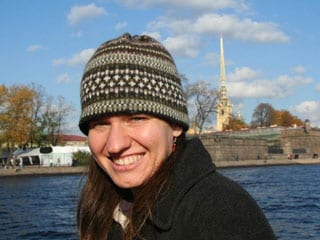
Lara Peterson on the Neva River with a view of the Peter and Paul Fortress in St. Petersburg, Russia.
SRAS: You have a resume filled with environment-related experience that obviously helped you get to the career you now enjoy. I would like to start with two early study-abroad experiences you had while still a student. As an undergrad, you went to Tanzania. Can you tell us about how you found out about that experience and what you learned while abroad?
LP: I ended up in Tanzania by accident, in a way. My first study abroad experience was in Russia – I studied Russian throughout my undergrad experience (my second major, along with Conservation Biology with a Wildlife emphasis). I had an open semester during the fall of my last year of college since my remaining classes were only offered in the winter. I was wandering around a study abroad fair looking for ideas with the intention of finding a way to get to Russia again (I studied in St. Petersburg for a semester as a Sophomore). But, as a wildlife major, I had always been fascinated by the big game in Africa and got ‘sidetracked’ by a booth on an ongoing program in Tanzania through my University’s Field Studies and Internship Program. The next thing I knew, I was taking African studies courses and learning Swahili in preparation for my study abroad experience in Tanzania. It was an amazing and fulfilling experience. During my almost 5 months in Tanzania, I learned so much about village life in East Africa, Swahili language and culture, international development, and natural resource use. I had unique experiences such as volunteering briefly and informally with the Jane Goodall Institute’s Roots and Shoots program in Dar es Salaam, staying with a medicine man’s family to learn about his healing practice and how to make Zanzibari food, learning about big game on Safari, interviewing women in my village about resource use, and so much more. Most of all, I gained a better perspective of the challenges people face around the world and learned to more fully appreciate the opportunities I have had in my life.
SRAS: Yes, often the surprises in life are the most enjoyable moments. Your had another experience abroad as a graduate student, when you were an early pioneer on SRAS’s environmental programs in Irkutsk, Russia, studying on our Siberian Studies course there in 2001. How did you find out about that program and why did you choose to sign up with us?
LP: As a graduate student at University of Michigan, I was enrolled in a dual degree program in natural resources management and Russian and East European studies. I was drawn to Siberia (Irkutsk in particular) as a good area to conduct my research for two reasons – vast and important natural resources such as the taiga forest and Lake Baikal and a strong, grass-roots, environmental movement. I was looking for a way to get back to Russia and learn about Siberia and the environmental issues there and ran across the SRAS Siberian Studies course during my search. The program seemed like a good way to advance my technical vocabulary and learn about the region before diving into my graduate research.
SRAS: What did you learn while abroad and do you think that knowledge specifically played a role in helping you land your job? I assume you still use your knowledge of Siberia’s environment on-the-job?
LP: While abroad, I improved my Russian, learned more about environmental issues in the Irkutsk region and in Russia, and made some good contacts. But mostly, I fell in love with Siberia and Lake Baikal. Because of my experience there, I was able to jump right into my graduate research project, which had a case study near Lake Baikal. And that research experience certainly helped lead me to my current job. My first-hand knowledge of Siberia’s environment is very useful in my work.
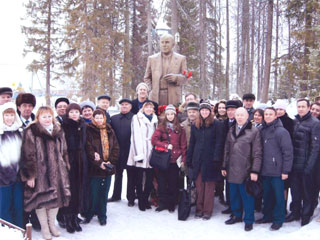
The US Forest Service delegation with the staff of Sabinsky Leskhoz in Tartarstan, Russia. “Leskhoz” is short for “lesnoe kozyistvo” (лесхоз = лесное хозяйство), and refers to a forestry station that is usually involved in both planting and felling trees.
SRAS: Great! You completed a joint Master’s program at the University of Michigan, graduating with an MS in Natural Resources and Environment and an MA in Russian and East European Studies. Do you think it is common for students to combine Russian studies with scientific fields? Do you think more students should consider such joint programs – and would you recommend your alma mater for others?
LP: When I would explain my majors as a student, people would often ask, ‘those are two very different fields – what are you going to do with that?’ And honestly, I didn’t have a clear idea of where my studies would take me when I started out. But I am a firm believer that if you study what you enjoy, you can find a way to make it work for you. For me, that was natural resources and Russian. I think it is an unusual combination, though there just happened to be four of us in the same dual degree program when I started at Michigan! I do think more students should consider interdisciplinary programs – employers (at least in my field) seem to look positively on the diverse experiences that such programs bring to students. And yes, I do recommend my alma mater! University of Michigan is very supportive of joint programs in many fields. And I think there are at least six UM graduates in my office currently!
SRAS: Your thesis was written on “Modeling land-cover change in the Siberian boreal forest: a case study in the Irkutsk Region.” Can you, for the layman, explain briefly what land cover is – and how it’s changing in Siberia?
LP: My thesis looked at how the landscape is changing in Siberia from disturbances such as logging, forest fires, pests, regrowth of forests, etc. Such dynamics are – in the case of fire and pests – a natural part of the ecosystem and always occurring. But our theory was that the management and socio-economic changes that occurred after the breakup of the Soviet Union would be visible through the changes in the physical landscape, and that these differences and changes could be measured and modeled using satellite data and geographic information. For example, logging decreased dramatically after the fall of the Soviet Union, but is increasing again. Pest outbreaks make the forest more susceptible to large-scale fires. On the other hand, the amount of land in specially protected areas has increased, as have efforts to promote ecotourism and environmental education. These dynamics are very complex, and the changes as well as the impacts of those changes are different depending on the site and local situation.
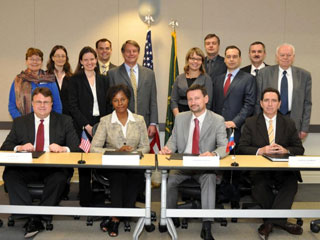
US-Russia Bilateral Forestry Working Group Meeting, Washington, DC, April 2012. Key counterparts from the US Agency for International Development, US Forest Service, Russian Federal Forestry Agency, and US Department of State met to discuss national-level priorities in both countries and explore opportunities for collaboration on those topics.
SRAS: I’m also curious about your time spent at METI, an American company that has operations in managing natural resources in Russia. What exactly does METI do and what did you do for them?
LP: Management and Engineering Technologies International, Inc. (METI) is a small professional services company that provides management and technology support to the federal sector and private industry. I started my work with USFS International Programs as a contractor through METI, where I gained experience working on international natural resource management issues within the US government.
SRAS: What is the most interesting experience you’ve had with Russia to date?
LP: That’s a tough one! There are so many. Unexpectedly spending a few extra days with Russian foresters on the shore of Lake Baikal, catching omul and gathering pine nuts, berries and mushrooms for our meals. Learning about my St. Petersburg host grandmother’s experience living through the Leningrad Blockade. Dog-sledding and back-country skiing in Kamchatka. Seeing famous landmarks such as Red Square and St. Basil’s cathedral for the first time. Hiking through the forest of Primorye and seeing wild tiger cub tracks. I have been so lucky to have so many amazing experiences with Russia, getting to know the people, culture, history, nature, food. My work has brought me to some of the most remote and beautiful spots on earth. And even the day-to-day experiences of just trying to get around can be a real adventure! I could go on and on!
SRAS: As could we all! What advice would you have for students interested in building a Russia-related career?
LP: Find a way to spend significant time in Russia. That is the only way to truly learn the language and culture. Living abroad and immersing yourself in another language is not always easy or comfortable, but it is rewarding. There are so many study abroad programs out there now – take advantage of them! And if possible, try to combine it with something else you love. Language and international skills are a great addition to any career and can lead you in unexpected directions. There are opportunities out there – you just have to search for them.


